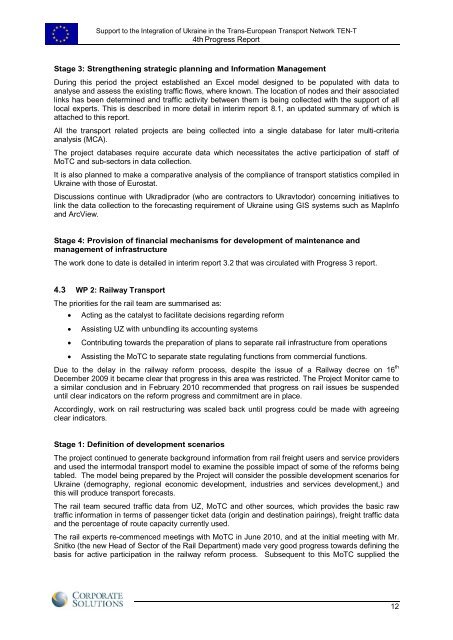Progress Report 4
Progress Report 4
Progress Report 4
Create successful ePaper yourself
Turn your PDF publications into a flip-book with our unique Google optimized e-Paper software.
Support to the Integration of Ukraine in the Trans-European Transport Network TEN-T<br />
4th <strong>Progress</strong> <strong>Report</strong><br />
Stage 3: Strengthening strategic planning and Information Management<br />
During this period the project established an Excel model designed to be populated with data to<br />
analyse and assess the existing traffic flows, where known. The location of nodes and their associated<br />
links has been determined and traffic activity between them is being collected with the support of all<br />
local experts. This is described in more detail in interim report 8.1, an updated summary of which is<br />
attached to this report.<br />
All the transport related projects are being collected into a single database for later multi-criteria<br />
analysis (MCA).<br />
The project databases require accurate data which necessitates the active participation of staff of<br />
MoTC and sub-sectors in data collection.<br />
It is also planned to make a comparative analysis of the compliance of transport statistics compiled in<br />
Ukraine with those of Eurostat.<br />
Discussions continue with Ukradiprador (who are contractors to Ukravtodor) concerning initiatives to<br />
link the data collection to the forecasting requirement of Ukraine using GIS systems such as MapInfo<br />
and ArcView.<br />
Stage 4: Provision of financial mechanisms for development of maintenance and<br />
management of infrastructure<br />
The work done to date is detailed in interim report 3.2 that was circulated with <strong>Progress</strong> 3 report.<br />
4.3 WP 2: Railway Transport<br />
The priorities for the rail team are summarised as:<br />
• Acting as the catalyst to facilitate decisions regarding reform<br />
• Assisting UZ with unbundling its accounting systems<br />
• Contributing towards the preparation of plans to separate rail infrastructure from operations<br />
• Assisting the MoTC to separate state regulating functions from commercial functions.<br />
Due to the delay in the railway reform process, despite the issue of a Railway decree on 16 th<br />
December 2009 it became clear that progress in this area was restricted. The Project Monitor came to<br />
a similar conclusion and in February 2010 recommended that progress on rail issues be suspended<br />
until clear indicators on the reform progress and commitment are in place.<br />
Accordingly, work on rail restructuring was scaled back until progress could be made with agreeing<br />
clear indicators.<br />
Stage 1: Definition of development scenarios<br />
The project continued to generate background information from rail freight users and service providers<br />
and used the intermodal transport model to examine the possible impact of some of the reforms being<br />
tabled. The model being prepared by the Project will consider the possible development scenarios for<br />
Ukraine (demography, regional economic development, industries and services development,) and<br />
this will produce transport forecasts.<br />
The rail team secured traffic data from UZ, MoTC and other sources, which provides the basic raw<br />
traffic information in terms of passenger ticket data (origin and destination pairings), freight traffic data<br />
and the percentage of route capacity currently used.<br />
The rail experts re-commenced meetings with MoTC in June 2010, and at the initial meeting with Mr.<br />
Snitko (the new Head of Sector of the Rail Department) made very good progress towards defining the<br />
basis for active participation in the railway reform process. Subsequent to this MoTC supplied the<br />
12


